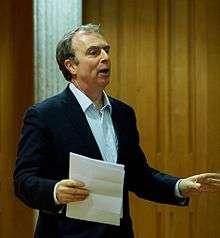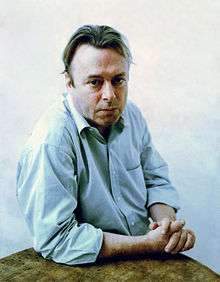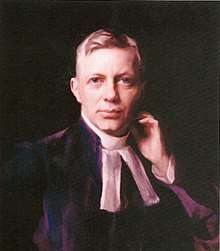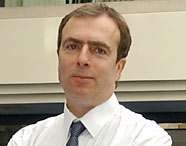Peter Hitchens
| Peter Hitchens | |
|---|---|
 Hitchens participating in a debate (2015) | |
| Born |
Peter Jonathan Hitchens 28 October 1951 Sliema, Crown Colony of Malta |
| Nationality | English |
| Alma mater | University of York |
| Occupation | Journalist, author |
| Political party |
International Socialists (1969-75) Labour Party (1977-83) Conservative Party (1997-2003) |
| Spouse(s) |
Eve Ross (m. 1983) |
| Children | 3 |
| Relatives | Christopher Hitchens (brother) |
| Website |
hitchensblog |
Peter Jonathan Hitchens (born 28 October 1951) is an English journalist and author. He has published eight books, including The Abolition of Britain, The Rage Against God, and The War We Never Fought. He is a critic of political correctness and describes himself as an Anglican Christian and Burkean conservative,[1] as well as a social democrat.[2] Hitchens writes for The Mail on Sunday and is a former foreign correspondent in Moscow and Washington.
In 2010, Hitchens was described by Edward Lucas in The Economist as "a forceful, tenacious, eloquent and brave journalist. He lambasts woolly thinking and crooked behaviour at home and abroad."[3] In 2009, Anthony Howard wrote of Hitchens, "the old revolutionary socialist has lost nothing of his passion and indignation as the years have passed us all by. It is merely the convictions that have changed, not the fervour and fanaticism with which they continue to be held."[4]
Early life and family
Peter Hitchens was born in the Crown Colony of Malta, where his father, Eric Ernest Hitchens (1909–1987), a career naval officer,[5] was stationed as part of the then Mediterranean Fleet of the Royal Navy. Hitchens had hoped to become a naval officer himself, but an eye defect prevented him from doing so.[6] His mother, Yvonne Jean Hitchens (née Hickman; 1921–1973), committed suicide in Athens[7] in a pact with her lover, a defrocked clergyman named Timothy Bryan.[8] The pair overdosed on sleeping pills in adjoining hotel rooms, and Bryan slashed his wrists in the bathtub.
Hitchens attended The Leys School and the City of Oxford College[9] before being accepted at the University of York, where he studied Philosophy and Politics and was a member of Alcuin College, graduating in 1973.[10]
He married Eve Ross, the daughter of journalist David Ross, in 1983.[11] They have three children: a daughter and two sons.[10] Their elder son, Dan, is Deputy Editor of the Catholic Herald, a London-based Roman Catholic magazine.[12]
Relationship with his brother

Peter's only sibling was Christopher Hitchens, the author, columnist, essayist, orator and religious critic, who was two years older. Christopher said the main difference between the two is a belief in the existence of God.[13]
Hitchens became a member of the International Socialists (forerunners of the modern Socialist Workers' Party)[14] from 1968 to 1975 (beginning at age 17) after Christopher introduced him to them.
The brothers fell out after Peter wrote a 2001 article in The Spectator.[15][13] After the birth of Peter's third child, the two brothers reconciled.[16]
Hitchens' review of God Is Not Great led to a public argument between the brothers but no renewed estrangement.[17] In the review, Peter claimed his brother's book made a number of incorrect assertions.
In 2007, the brothers appeared as panelists on BBC TV's Question Time, where they clashed on a number of issues.[18] In 2008, in the US, they debated the 2003 invasion of Iraq and the existence of God.[19] In 2010 at the Pew Forum, the pair debated the nature of God in civilization.[20]
Christopher Hitchens died in 2011; at a memorial service held for him in New York, Peter Hitchens read a passage from St Paul's Epistle to the Philippians which Christopher himself had read at their father's funeral.[21]
Journalism
He joined the Labour Party in 1977 but left shortly after campaigning for Ken Livingstone in 1979, thinking it wrong to carry a party card when directly reporting politics,[22] and coinciding with a culmination of growing personal disillusionment with the Labour movement.[23]
Hitchens worked for the Daily Express between 1977 and 2000, initially as a reporter specialising in education and industrial and labour affairs, then as a political reporter, and subsequently as deputy political editor.[22] Leaving parliamentary journalism to cover defence and diplomatic affairs, he reported on the decline and collapse of communist regimes in several Warsaw Pact countries, which culminated in a stint as Moscow correspondent and reporting on the final months of the Soviet Union and the early years of the Russian Federation in 1990–92. He took part in reporting the UK 1992 general election, closely following Neil Kinnock.[24] He then became the Daily Express Washington correspondent.[25] Returning to Britain in 1995, he became a commentator and columnist.
In 2000, Hitchens left the Daily Express after its acquisition by Richard Desmond,[26] stated that working for him would have represented a moral conflict of interest.[27] Hitchens joined The Mail on Sunday, where he has a weekly column and weblog in which he debates directly with readers. Hitchens has also written for The Spectator and The American Conservative magazines, and occasionally for The Guardian, Prospect, and the New Statesman.
After being shortlisted in 2007[28] and 2009,[29] Hitchens won the Orwell Prize in political journalism in 2010.[30] Peter Kellner, one of the Orwell Prize judges, described Hitchens's writing as being "as firm, polished and potentially lethal as a Guardsman's boot."[31]
A regular on British radio and television, Hitchens has been on Question Time,[32] Any Questions?, This Week,[33] The Daily Politics and The Big Questions.[34] He has authored and presented several documentaries on Channel 4, including critical examinations of Nelson Mandela[35] and David Cameron.[36] In the late 1990s, Hitchens co-presented a programme on Talk Radio UK with Derek Draper and Austin Mitchell.[37]
Foreign reporting
Hitchens first worked as a foreign reporter in the 1980s, mainly reporting from the Eastern Bloc, with his first such assignment to Poland during the Solidarity crisis in November 1980. He travelled to Japan and Germany during his time as an industrial reporter and reported from several other countries, including the USA, Japan, and South Korea as part of the group of reporters accompanying Margaret Thatcher. After witnessing the Velvet Revolution and the Romanian Revolution, he became the Daily Express resident Moscow Correspondent in June 1990. He left Moscow (via the Bering Strait) in October 1992, and was briefly based in London during which time he reported from South Africa during the last days of apartheid, and from Somalia[38] at the time of the United Nations intervention in the Somali Civil War.
In September 1993 he became the Daily Express resident Washington correspondent and, during the next two years, he reported from many of the 50 states, as well as from Canada, Haiti and Cuba. He continued his foreign reporting after joining The Mail on Sunday, for which he has written reports from all over the globe, including Russia, Ukraine (described by Edward Lucas as a "dismaying lapse"[3]), Turkey, Gaza, a visit to Iraq in the wake of the 2003 invasion, an undercover report from Iran (described by Iain Dale as "quite brilliant"[39]), China, and North Korea.
Political views
Hitchens joined the Conservative Party in 1997 and left in 2003. He challenged Michael Portillo for the Conservative nomination in the Kensington and Chelsea seat in 1999.[40]
Hitchens advocates a society governed by conscience and the rule of law, which he sees as the best guarantee of liberty. He believes that capital punishment is an element of a strong justice system,[41][42] and he was the only British journalist to attend and write about the execution of Nicholas Ingram in America in 1995.[43]
Hitchens was critical of the New Labour government, viewing a number of policies proposed by that government as attacks on liberty and as facets of a constitutional revolution.[44]
Hitchens advocates harsh penalties properly enforced for the illegal use of cannabis,[45] including calling the substance "one of the most dangerous drugs known to man,"[46] and is opposed to the decriminalisation of recreational drugs in general. In 2012, Hitchens gave evidence to the Parliamentary Home Affairs Select Committee as part of its inquiry into drugs policy, and called for the British government to introduce a more hardline policy on drugs.[47]
Hitchens once clashed with Iain Duncan Smith on Question Time, opposing the privatisation of railways.[1]
In 2010 Michael Gove, writing in The Times, asserted that, for Hitchens, what is more important than the split between the Left and the Right is "the deeper gulf between the restless progressive and the Christian pessimist."[48]

Hitchens has been a prominent member of the campaign to clear the name of the late Bishop of Chichester, George Bell from allegations of child sexual abuse.[49] He has demanded justice for Bell.[50] Hitchens has said that the Church of England convicted him in what he described as a kangaroo court,[51] and stated his wish that allegations are not treated as proven facts.[52]
Religious views
While Peter Hitchens used to be an atheist,[53] he became a Christian later in his life. He became a member of the Church of England. He argues that social liberals and cultural Marxists have systematically undermined Christianity. "The left's real interests are moral, cultural, sexual and social. They lead to a powerful state. This is not because they actively set out to achieve one," Hitchens wrote.[54] He also believes that the First World War is the cause of the demise of Christianity in Europe.[55]
Hitchens has been consistently dismissive of the modern Conservative Party, and expressed support for a more socially conservative alternative to the Conservatives to occur post-Brexit.[56] Despite this, he did not vote to leave in the Brexit referendum, which he deplored.[57] He has also described Brexit as a "constitutional crisis" due to the pro-EU makeup of Parliament and has stated that he believes it would take ten years for Britain to leave the European Union completely.[57] He has endorsed the Flexcit model proposed by Richard North and Christopher Booker as the most sensible and moderate way to leave the EU while remaining in the European Economic Area to preserve the economic benefits of EU membership.[58]
Publications

Hitchens is the author of The Abolition of Britain (1999) and A Brief History of Crime (2003), both critical of changes in British society since the 1960s. A compendium of his Daily Express columns was published as Monday Morning Blues in 2000. A Brief History of Crime was reissued as The Abolition of Liberty in April 2004, with an additional chapter on identity cards ("Your papers, please"), and with two chapters – on gun control ("Out of the barrel of a gun") and capital punishment ("Cruel and unusual") – removed.
The Broken Compass: How British Politics Lost its Way was published in May 2009, and The Rage Against God was published in Britain in March 2010, and in the US in May.
Hitchens's book The War We Never Fought: The British Establishment's Surrender to Drugs, about what he sees as the non-existence of the war on drugs, was published by Bloomsbury in the autumn of 2012.[59]
In June 2014 he published his first e-book, Short Breaks in Mordor, a compendium of foreign reports.[60]
Bibliography
- The Abolition of Britain (1999)
- Monday Morning Blues (2000)
- A Brief History of Crime (2003), updated in softcover as The Abolition of Liberty: The Decline of Order and Justice in England (2004)
- The Broken Compass (2009), updated in softcover as The Cameron Delusion (2010)
- The Rage Against God (2010)
- The War We Never Fought (2012)
- Short Breaks in Mordor (2014)
- The Phoney Victory: The World War II Illusion (2018) ISBN 9781788313292
See also
References
- 1 2 White, JT. "Why I respect Peter Hitchens". Spectre 27 December 2014
- ↑ Rentoul, John (20 November 2013). "Peter Hitchens: One-way tweets". The Independent. Retrieved 28 December 2016.
- 1 2 Lucas, Edward (29 September 2010). "Foggy at the bottom". The Economist. Retrieved 30 September 2010.
- ↑ Howard, Anthony (21 May 2009). "The Broken Compass: How British Politics Lost Its Way by Peter Hitchens". New Statesman. Retrieved 2 May 2012.
- ↑ Cook, Tom (23 October 2012). "The other Hitchens boy". New Statesman. Retrieved 24 August 2018.
- ↑ "The Boy Can't Help It". The NY Mag. 26 April 1999. Retrieved 23 April 2012.
- ↑ Barber, Lynn (2002). "Look who's talking". The Observer.
- ↑ Walsh, John (27 May 2010). "Hitch-22: a memoir by Christopher Hitchens". The Independent. Retrieved 28 May 2010.
- ↑ "Toffs at the top". Press Gazette. 16 June 2006. Archived from the original on 16 June 2011. Retrieved 2 May 2012.
- 1 2 "Peter Hitchens | Nigel Farndale". www.nigelfarndale.com. Retrieved 7 October 2015.
- ↑ https://familysearch.org/ark:/61903/1:1:QVXF-MG2Z
- ↑ The trouble with Catholic politicians Published by Catholic Herald, 12 July 2018, retrieved 18 August 2018
- 1 2 Katz, Ian (31 May 2005). "When Christopher met Peter". The Guardian.
- ↑ Jones, Owen (9 September 2015). "Peter Hitchens got me thinking: do lefties always have to turn right in old age?". The Guardian.
- ↑ "O Brother, Where Art Thou?". The Spectator Archive. Retrieved 5 January 2018.
- ↑ Katz, Ian (28 October 2006). "War of Words". The Guardian.
- ↑ James Macintyre, The Hitchens brothers: Anatomy of a row Archived 29 August 2008 at the Wayback Machine., The Independent, 11 June 2007. Retrieved 11 June 2007.
- ↑ Tryhorn, Chis (22 June 2007). "Boris steals Question Time's Hitchens show". The Guardian. Retrieved 22 August 2018.
- ↑ "Hitchens vs Hitchens Debate – On God, War, Politics, and Culture". cfimichigan.org. Retrieved 3 May 2012.
- ↑ Eric Marrapodi (13 October 2010). "Hitchens brothers debate if civilization can survive without God". CNN. Retrieved 14 October 2010.
- ↑ "Christopher Hitchens remembered at memorial service in NYC". The Washington Post. 20 April 2012. Retrieved 28 April 2012.
- 1 2 Silver, James (14 November 2005). "Look forward in anger". The Guardian. Retrieved 2 April 2007.
- ↑ Maguire, Kevin (7 June 2000). "How 'Bonkers' launched the battle for Britain". The Guardian. Retrieved 31 August 2018.
- ↑ Hattenstone, Simon (20 September 1999). "Raging bulldog: Peter Hitchens". The Guardian.
- ↑ Silver, James (14 November 2005). "Look forward in anger". The Guardian.
- ↑ Hodgson, Jessica (7 December 2000). "Hitchens quits Express". The Guardian. Retrieved 28 April 2012.
- ↑ "Veteran columnist quits Express" (report). BBC News. 9 December 2000. Retrieved 2 November 2006.
- ↑ Martin Moore for the Frontline Club. 1 May 2007 The Orwell Prize 2007. Quote: "...judge Francis Wheen congratulated a strong field that included ...Peter Hitchens – more for his delightfully frank foreign dispatches than his 'fire and brimstone' Mail columns (read, for example, his article on 'Iran – a nation of nose jobs, not nuclear war')."
- ↑ Amos, Owen (26 March 2009). "Shortlists announced for Orwell Prize for political writing". Press Gazette. UK. Archived from the original on 28 April 2011. .
- ↑ Trilling, Daniel (20 May 2010). "Peter Hitchens wins the Orwell Prize". New Statesman. Retrieved 25 May 2010.
- ↑ Goligher, Kate (25 May 2010). "University of York graduate Peter Hitchens wins Orwell prize for foreign correspondence". Nouse. Retrieved 28 April 2012.
- ↑ "Peter Hitchens on why we should leave Russia be and how the Second World War was 'phoney'". The Irish Times. Dublin. 8 March 2018. Retrieved 23 August 2018.
- ↑ "Peter Hitchens". This Week. News. The BBC. 6 October 2006. Retrieved 3 May 2012.
- ↑ "The Big Questions Comments". tvguide.co.uk. 8 April 2018. Retrieved 23 August 2018.
- ↑ Sampson, Anthony (15 May 2004). "Mandela is not a saint, but he could teach Blair and Bush about peace-making". The Independent. UK. Retrieved 1 May 2012.
- ↑ "Last night's TV: Dispatches: Cameron - Toff at the Top". The Guardian. 27 March 2007. Retrieved 1 August 2018.
- ↑ "Hear me roar". The Guardian. 3 April 2000. Retrieved 17 March 2008.
- ↑ "Peter Hitchens: The UK is an 'atrophied' nation". radionz.co.nz. 17 February 2018. Retrieved 22 August 2018.
- ↑ "Peter Hitchens & Iran". Iain Dale's Diary. Retrieved 30 January 2010.
- ↑ Ward, Lucy (17 September 1999). "Byelection contender denounces 'liberal' Portillo". The Guardian. UK. Retrieved 2 May 2012.
- ↑ "Amnesty TV: Peter Hitchens and the death penalty". The Guardian. 5 October 2011. Retrieved 28 April 2012.
- ↑ Says, Sharon (19 May 2011). "Hitchens on the death penalty". Oxford student. Retrieved 28 April 2012.
- ↑ Rose, David (13 April 2003). "Hanging's too good for 'em". The Observer. UK. Retrieved 31 August 2018.
- ↑ Keith Sutherland (2000). The Rape of the Constitution?. Imprint Academic. p. 93. ISBN 978-0-907845-70-6.
- ↑ Jack Staples-Butler 27 June 2013 (27 June 2013). "The Yorker Meets... Peter Hitchen". Theyorker.co.uk. Archived from the original on 10 July 2014. Retrieved 7 June 2014.
- ↑ Bowman, Sam (29 August 2012). "Even drug prohibitionists should be embarrassed by Peter Hitchens". Adam Smith Institute. Retrieved 2 July 2018.
- ↑ "Hitchens urges tough drugs policy". The BBC. 24 April 2012. Retrieved 28 April 2012.
- ↑ Gove, Michael (5 May 2009). "Dazzling divisions of the Hitchens brothers". The Times. UK. Retrieved 30 March 2010. (Subscription required (help)).
- ↑ O'Grady, Jack (25 February 2018). "The Church of England should stand up for Bishop Bell". oxfordstudent.com. Retrieved 30 August 2018.
- ↑ Wolfson, Sam (15 December 2017). "The Day the Church Stopped Believing Victims". Vice Media. Retrieved 30 August 2018.
- ↑ Sherwood, Harriet (15 December 2017). "Anglican church 'rushed to judgment' in George Bell child abuse case". The Guardian. Retrieved 30 August 2018.
- ↑ Parkinson, Justin (5 May 2016). "George Bell: The battle for a bishop's reputation". BBC News. Retrieved 30 August 2018.
- ↑ "How an atheist journalist became a Christian believer". Premier Christianity. 30 March 2016. Retrieved 31 August 2018.
- ↑ White, JT. "Why I respect Peter Hitchens" Spectre|27 December 2014.
- ↑ "The Foul Tornado". The American Spectator. Retrieved 26 May 2016.
- ↑ Perrins, Laura (28 June 2016). "The Laura Perrins interview: Brexit is a chance for a new socially conservative party, says Hitchens". The Conservative Woman.
- 1 2 Adam Payne (21 July 2017). PETER HITCHENS: Tory Establishment 'Vote Leave' Doesn't Want To Britain To Exit EU". Retrieved 24 August 2018.
- ↑ "Peter Hitchens: I have got 'a lot of pleasure' out of Corbyn's success".
- ↑ Ross. "The War We Never Fought The British Establishment's Surrender to Drugs By Peter Hitchens". educationumbrella.com. Retrieved 22 August 2018.
- ↑ Aspinall, John (24 July 2014). "A Misunderstood Man: Short Breaks in Mordor by Peter Hitchens". The Telegraph. Archived from the original on 4 March 2016.
External links
| Wikiquote has quotations related to: Peter Hitchens |
- Peter Hitchens on Twitter

- Peter Hitchens on IMDb
- Appearances on C-SPAN
- Hitchens (31 December 2000). "On The Abolition of Britain" (interview). Booknotes. Archived from the original on 2 January 2012.
- Hitchens, Peter (January 2005). "City New Year Service, The Parish Church" (PDF) (address). St. Michael's Cornhill, London. Archived from the original (PDF) on 2 October 2008.
- Hitchens, Peter. "Articles". American Conservative (archive).
- Hitchens, Peter. "Drug Culture". Institute of Art and Ideas. Retrieved 3 January 2014.